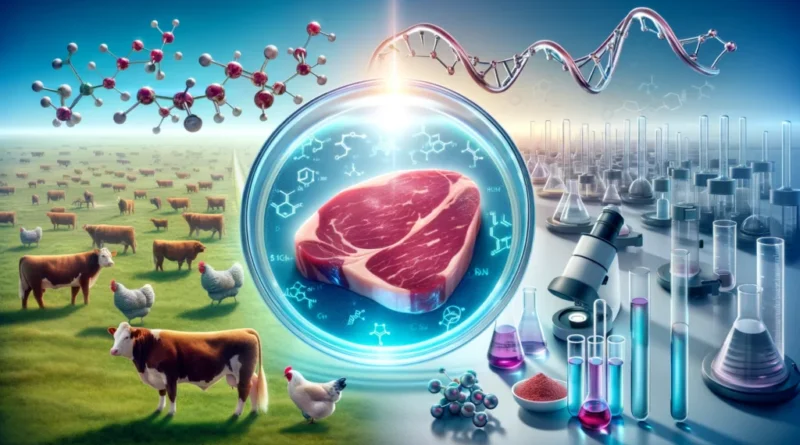Lab-Grown Meat Faces Legislative Hurdles Amid Growing Resistance
Lab-grown meat, also known as cultivated meat, is facing increasing resistance from lawmakers across the United States. This burgeoning industry, which involves growing meat from animal cells, has seen significant advancements but is now encountering legislative roadblocks that could hinder its growth.
Recent Bans and Legislative Actions
In recent months, both Florida and Arizona have enacted bans on the sale of cultivated meat and seafood. In Iowa, the governor signed a bill prohibiting schools from purchasing lab-grown meat. These state-level actions are part of a broader trend, with federal lawmakers also considering restrictions.
Despite these setbacks, some states like Tennessee have shelved proposed bans after lawmakers argued that such measures would limit consumer choices. However, the overall momentum appears to be against the cultivated meat industry, which is prompting some companies to consider legal action.
Optimism Turns to Uncertainty
The year began with high hopes for the lab-grown meat sector. In June 2023, the U.S. approved the sale of lab-grown meat for the first time, allowing California startups Good Meat and Upside Foods to sell cultivated chicken. This milestone led to brief appearances of these products on the menus of high-end U.S. restaurants and even a grocery store in Singapore. However, the optimism was short-lived as political resistance began to mount.
According to Kim Tyrrell, an associate director with the National Conference of State Legislatures, lawmakers in seven states have introduced legislation to ban cultivated meat. This growing opposition is creating an uncertain future for the industry.
Federal and International Pushback
In the U.S. Senate, Democratic Sen. Jon Tester of Montana and Republican Mike Rounds of South Dakota introduced a bill in January to prohibit the use of lab-grown meat in school lunch programs. The backlash is not confined to the U.S.; Italy banned the sale of lab-grown meat late last year, and French lawmakers have also introduced a bill to ban it.
Despite the fact that lab-grown meat is still far from being widely available due to its high production costs, the opposition is strong. Cultivated products are grown in steel tanks using cells from living animals, fertilized eggs, or storage banks. These cells are nourished with blends of water, sugar, fats, and vitamins before being formed into various meat shapes.
Industry Response and Legal Considerations
Companies in the cultivated meat industry are now focusing on scaling production to reduce costs and secure government approval for their products. Upside Foods has even launched a Change.org petition to urge supporters to oppose the state bans. Tom Rossmeissl, head of global marketing for Good Meat, expressed frustration, stating, “It’s a shame they are closing the door before we even get out of the gate.”
Proponents of the bans argue that they are protecting farmers and consumers. Republican state Sen. Jack Williams of Alabama, who sponsored his state’s bill, expressed concerns about the safety of lab-grown meat, stating, “Alabamians want to know what they are eating, and we have no idea what is in this stuff or how it will affect us.”
Safety and Economic Implications
Those within the cultivated meat industry argue that their products must meet rigorous government safety tests before being sold. They emphasize that the industry is not trying to replace traditional meat but to find ways to meet the world’s growing protein needs. Rossmeissl pointed out that the U.S. is leading the effort to develop cultivated meat and seafood, with 45 companies in the space. However, this leadership could be jeopardized by the growing legislative barriers.
State Sen. Jay Collins of Florida, who sponsored his state’s bill, noted that the legislation does not ban research, only the manufacturing and sale of lab-grown meat. Collins cited safety concerns and the need to protect Florida’s agriculture industry as his primary motivations.
Comparisons to Plant-Based Alternatives
Rossmeissl believes that the meat industry is trying to avoid a repeat of what happened to the dairy industry after the introduction of plant-based alternatives like oat milk. Plant-based milk now makes up 15% of U.S. milk sales, up from around 6% a decade ago, according to the U.S. Department of Agriculture and the Good Food Institute.
While state-level bans have found support from local cattlemen’s associations, the national meat industry does not support outright bans on cultivated products. Some meat producers, such as JBS Foods, are even developing their own cultivated meat products.
Legal and Market Challenges
The Meat Institute, representing major companies like JBS and Tyson, has warned that state bans may be unconstitutional since federal law regulates meat processing and interstate commerce. Wildtype, a San Francisco-based company that makes cultivated salmon, has also voiced opposition to the bans but acknowledges the difficulty of challenging them in court.
As the debate over lab-grown meat continues, the industry faces significant challenges but also opportunities for growth and innovation. The outcome of this legislative tug-of-war will likely shape the future of food production and consumption in the United States and beyond.
Source: Fox News




